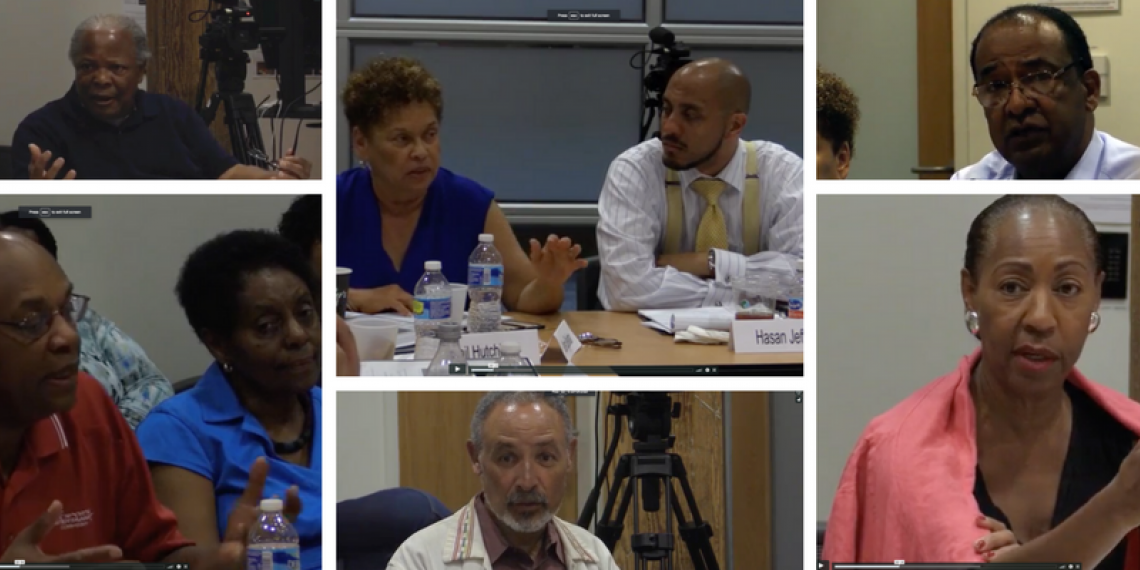With NEH Grant, CDS and SNCC Continue to Share the Grassroots Lessons of the Civil Rights Movement
Stills from the first series of critical oral history sessions in the summer of 2016, made possible by a grant from the Andrew W. Mellon Foundation
With a grant of $225,000 from the National Endowment for the Humanities, the Center for Documentary Studies at Duke University (CDS) and other Duke partners will build on their multi-year collaboration with the SNCC Legacy Project (SLP) to re-examine the history of voting rights, and its lessons for strengthening American democracy from the ground up.
The NEH grant will fund a groundbreaking series of “critical oral history” (COH) sessions in the summer of 2018 that will illuminate the work directly leading to the Voting Rights Act of 1965, legislation that after two hundred years finally allowed the nation to live up to its promise of “one person, one vote.” The COH participants will include veterans of the Student Nonviolent Coordinating Committee (SNCC) and other civil rights organizations; historians; participants in the Mississippi movement for voting rights; persons knowledgeable about the federal response; representatives of the early 1960s national press; and representatives of conservative and liberal organizations that either tried to impede or advance grassroots organizing in the African American communities of Mississippi and elsewhere in the South.
The critical oral histories represent a new methodology in the field, says CDS director Wesley Hogan, a civil rights scholar and oral historian. “Typically, the interviewee is simply asked to recount her or his experience by an interviewer who may not have done extensive prior research. Using critical oral histories, the questions and answers are much more precise and can spark a fresh approach to issues where there’s confusion or disagreement about how the work of the civil rights movement was done,” says Hogan.
Courtland Cox, board chair of the SLP, explains: “The critical oral history method, brought to this collaboration by SLP board members professor Geri Augusto and author and former professor Charlie Cobb, are conversations between 1960s veterans of the Mississippi movement and historians who are knowledgeable about the actions of the civil rights veterans or the resistance movement in Mississippi.” The COH sessions will also include “adjacent actors” who had an impact on the times and places where civil rights activists were most involved. A full documentary record of the period being discussed will be assembled to help refresh the recollections of the participants.
SLP board member Augusto notes: “Frank, poly-vocal discussions primed beforehand by the distribution of a collection of documents will spark, and even confront, memories. At the same time, new archives—documentary and otherwise—are created in the sessions, by what people say and bring to the table.”
Following completion of these COH sessions, a grant-funded book of essays will draw on the interviews to offer fresh perspectives. A collaborative research team will incorporate the new insights into the book’s overview of how the Voting Rights Act of 1965 came to be, one that illustrates the civil rights era as “a continuation of the ongoing struggle by African Americans to convey to each new generation a commitment to resist an unequal status quo,” says Cox.
The leaders of the critical oral histories project include Courtland Cox, board chair of the SNCC Legacy Project; Jennifer Lawson, SNCC veteran; William Chafe, the co-founder of the Center for Documentary Studies and a noted Duke historian; and Wesley Hogan, director of the Center for Documentary Studies. Lawson noted: “It is our plan to make this interpretive volume the basis for a new K–12 curriculum in the nation’s public schools, as well as the framework for teaching the history of voting rights and the civil rights movement in the country’s colleges and universities.”
The critical oral history sessions being conducted at CDS dovetail with another NEH-funded project at Duke in the summer of 2018. Thirty high school teachers from across the U.S. will participate in a three-week residency to learn the bottom-up history of the civil rights movement, and will return to their classrooms with new pedagogical resources, strategies, and skills. “The Civil Rights Movement: Grassroots Perspectives” summer institute will be directed by Duke professor Robert Korstad and SNCC veteran and former professor Judy Richardson, and co-sponsored by the Franklin Humanities Institute, the institute’s Human Rights Center, and the Washington, D.C.–based nonprofit, Teaching for Change, headed by Deborah Menkart, who will be the summer institute’s curriculum coordinator. Chafe observed that “these two grants represent a magnificent opportunity both to get to the heart of the civil rights struggle in 1964–65, and to bring these insights into how American history is taught in our public schools.”
Collectively, these projects expand on a unique collaboration between civil rights veterans of the SNCC Legacy Project (SLP) and Duke University, represented by the Center for Documentary Studies and Duke University Libraries. Since 2013, the partnership has strived to build a more thorough and accurate archival history of civil rights activism during the 1960s. With partial funding from the Andrew W. Mellon Foundation, the SLP-Duke partnership built on the success of a pilot phase to create the SNCC Digital Gateway. The online reference and portal to digitized materials makes SNCC’s informational wealth widely available to current and future generations. A Mellon grant also helped implement the innovative critical oral histories methodology; the first series of conversations, conducted in the summer of 2016, are available on the website.
“Our wish for the project overall is to offer hope, inspiration, and concrete examples for people going forward—a model of how social evolution happens, and how citizens can participate in a democracy as part of their day-to-day lives,” says Hogan.

